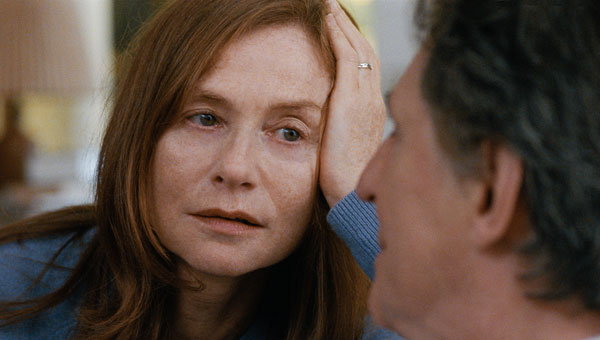Louder Than Bombs Review

In Joachim (Oslo, August 31st) Trier’s Louder Than Bombs, the death of a mother in a car crash, Isabelle, (Isabelle Huppert) lays bare the weaknesses between her husband Gene (Gabriel Byrne), and sons Jonah and Conrad (Jesse Eisenberg and Devin Druid) that everyday life previously hadn’t.
Her death is almost certainly a suicide, a fact which Gene has hidden from his youngest son Conrad, who was 12 at the time of the crash. With the release of an article alongside a posthumous retrospective of her photojournalism work detailing this fact of her death, Gene is confronted five years later with the prospect of having to tell Conrad the truth.
With Jonah visiting home just after the birth of his own son, the three men struggle to find their feet with each other, the new versions of themselves without Isabelle among them. The film explores the family tiptoeing around the crater of suicide, the hole left by the mother’s absence, and the questions such an act raises for those left behind with the knowledge.
Gabriel Byrne is quietly wonderful with his expressive face, as his son Conrad shoots him down again and again with that brutality with which adolescents excel at treating their parents with, yet keeps on smiling, keeps on encouraging, heartbreak creasing around his eyes.
Considering this is a film, there’s a lot of reading to get through. Emphasis is placed on faces in this film, and we’re occasionally forced to look at someone for longer than feels comfortable. All the actors bear the close ups well, wearing their emotions where they can be seen, even if they’re attempting to hide them.
Louder Than Bombs requires frequent mental adjustment as it’s not told chronologically, choosing to repeat sequences from different people’s perspectives in an interesting move that constantly reassigns significance and meaning.
There’s no kicking back and relaxing during the 90 minutes here, which is a good thing; spoon feeding is not for cinema. However if cinema fails to communicate, then it hasn’t done its job and, despite the many positives, Louder Than Bombs aim falls slightly off.
The film feels cold and a little underdeveloped, almost like a first cut. Whilst interesting and explorative, the constant shifts and changes in perspective mean that you don’t develop a well rounded sense of who to care for, whose decision is the correct one.
As a result, you care a little bit for everyone but not much for anyone in particular, and I found myself not really caring whether things worked out for the family.
The characters’ constant failure to communicate with each other left me feeling like they weren’t communicating with me either, and when Louder Than Bombs ended I simply wondered what the point was, even while suspecting it was a very good point.
It’s also jarring that every single family member has a different accent, which seems an odd choice to make in casting, particularly for a disjointed family: they don’t even sound like they belong together.
There’s a cold bluntness to Jesse Eisenberg’s character that makes even his compliments sound like veiled insults, and his advice to his little brother to not speak to a girl he likes because she’d never go for him has the kind of bluntness that would jar in a native speaker, and this distances the listener.
There’s a lot to like about Louder Than Bombs, but it feels more like a stepping stone before Trier delivers a better, more assured piece.
E J Robinson